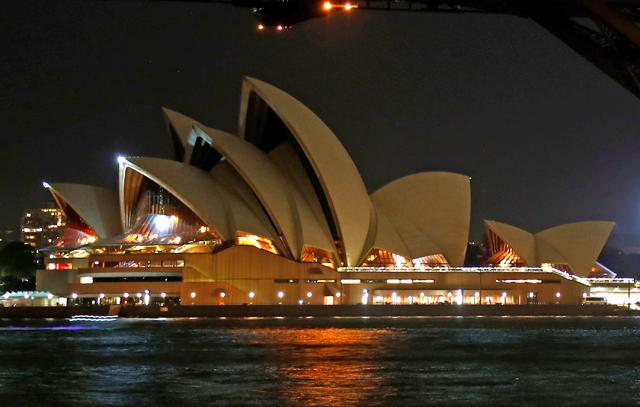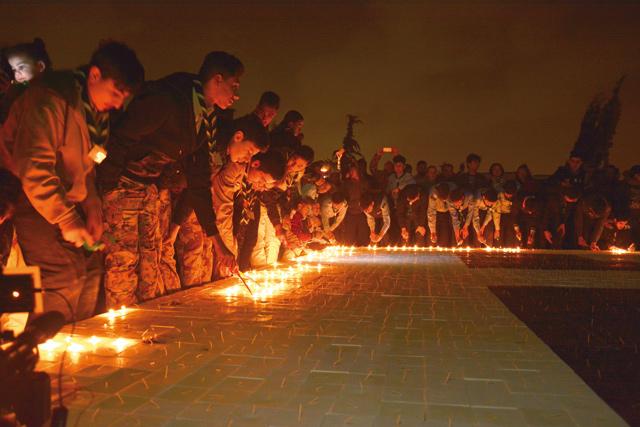You are here
Cities and monuments switch off for Earth Hour
By AFP - Mar 25,2017 - Last updated at Mar 25,2017

The Sydney Opera House seen during the tenth anniversary of Earth Hour in Sydney, Australia, on Saturday (Reuters photo)
SYDNEY — Sydney's Opera House and Harbour Bridge plunged into darkness on Saturday to mark Earth Hour, as global landmarks began dimming their lights to draw attention to climate change.
Millions of people from some 170 countries and territories are expected to take part in the annual bid to highlight global warming caused by the burning of coal, oil and gas to drive cars and power plants.
The event, which originated in Sydney, has grown to become a worldwide environmental campaign, celebrated across all continents.
Conservation group WWF, which organises Earth Hour, said great strides had been made in highlighting the dire state of the planet.
"We started Earth Hour in 2007 to show leaders that climate change was an issue people cared about," coordinator Siddarth Das said.
"For that symbolic moment to turn into the global movement it is today, is really humbling and speaks volumes about the powerful role of people in issues that affect their lives."
In Sydney, many harbourside buildings switched off their lights for an hour from 8.30pm local time, as the call for action began rolling out across the world.
"I agree with the concept, 100 per cent," said student Ed Gellert, 24, in Sydney.
"I think people probably avoid the fact that climate change is happening, so it's good to see the city grouping together to support Earth Hour."
From Australia, it was moving westward through Asia, with many of the skyscrapers ringing Hong Kong's Victoria Harbour going dark in solidarity, while at Myanmar's most sacred pagoda, the Shwedagon, 10,000 oil lamps were to be lit to shine a light on climate action.
In Singapore, some 200 organisations, including buildings along the city-state's iconic skyline, went dark to mark the occasion. Organisers said about 35,000 people watched performances and participated in a "carbon-neutral run", which saw some runners in panda and tiger costumes to raise awareness of wildlife protection.
And in Japan, Tokyo's famed Sony Building in Ginza extinguished its bright lights to honour the occasion.
The event will also be marked throughout Africa, Europe and the Americas.
Monuments including the Empire State Building, the Kremlin, Big Ben, the Leaning Tower of Pisa, the Eiffel Tower and Egypt's pyramids are all scheduled to switch off.
Lisbon will host a concert by candlelight, Singapore a "carbon-neutral run", and Tanzania will organise a tree-planting ceremony.
Homes and businesses were also being asked to join in, and individuals could commit to the cause on Facebook.
WWF said teams around the world would use Earth Hour this year to highlight climate issues most relevant to individual countries.
In South Africa, the focus would be on renewable energy while in China, WWF said it was working with businesses to encourage a shift towards more sustainable lifestyles.
Visible proof
Last year, scientists recorded the Earth's hottest temperatures in modern times for the third year in a row.
Nations agreed in Paris in 2015 to limit average global warming to 2°C over pre-industrial temperatures.
That is the level at which many scientists say humankind can still avoid worst-case climate outcomes in terms of rising sea levels, worsening droughts and floods, and increasingly violent superstorms.
"Climate change is visible proof that our actions can have a ripple effect beyond physical borders," Das said.
"It is up to each of us to ensure the impact we create helps instead to improve the lives of those around us and elsewhere, at present and in the future."
Earth Hour does not collect global statistics on the energy conserved during the 60-minute blackout, with the event having a more symbolic intent.
Related Articles
AMMAN — Striving to highlight Jordan's role in the fight to reduce global warming and address its impact on the Kingdom, the Royal Society f
AMMAN — Candlelight marches from ten locations across the country will kick off on Saturday night to urge society to pursue more responsible
AMMAN — Amidst the COVID pandemic, the annual Earth Hour event introduces the first-ever “Virtual Spotlight”, putting nature at the centre o

















